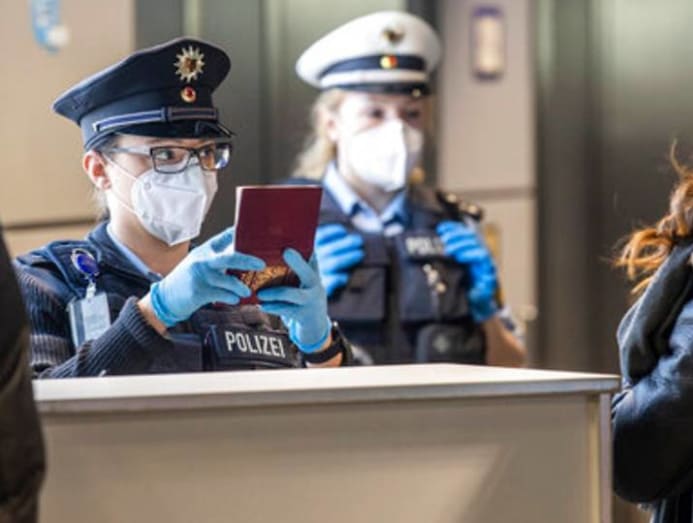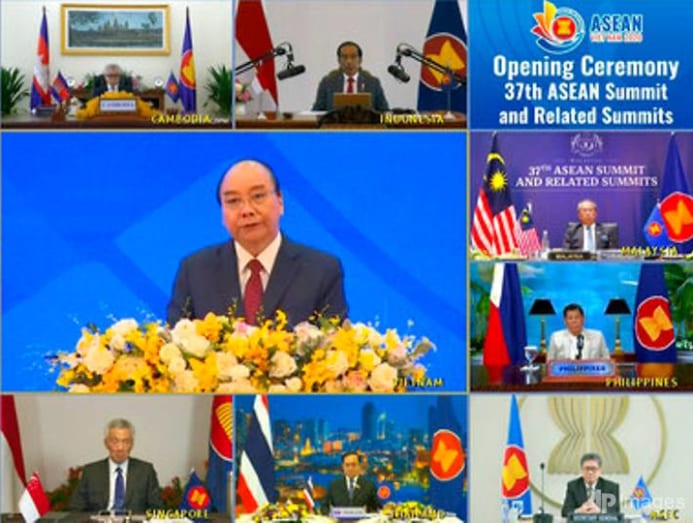Commentary: A digital vaccine passport could open up Southeast Asia travel bubble but some changes needed first
SINGAPORE: In March, ASEAN Economic Ministers discussed the possibility of launching a regional digital vaccine passport, reviving talk of an intra-ASEAN travel bubble.
If successfully launched, the passport will assist resuscitate the region's flailing tourism manufacture that contributes a significant amount to the Gross domestic product of each ASEAN fellow member land.
This edge-opening idea comes with several challenges, particularly data privacy ones, that ASEAN'south institutional structures are not presently well-suited to address.
Without institutional changes, this timely proposal probable will become another tombstone in the graveyard of beneficial ideas that could non survive Asean'south structures and principles.
The vaccine passport system is expected to store large amounts of personal information. If ASEAN is committed to successfully initiating the digital vaccine passport, it cannot ignore the longstanding absenteeism of strong ASEAN agreements that permit for region-wide comprehensive information privacy regulation.
Without this, information technology remains unclear if anyone tin can be held accountable should there be leaks of personal wellness data with an Asean digital vaccine passport.
READ: Commentary: How COVID-xix vaccines are existence weaponised as countries jostle for influence
READ: Commentary: Requiring proof of vaccination for travel raises bigger questions
DATA PRIVACY CONCERNS
ASEAN must be transparent about the potential bug of a vaccine passport to let individuals fully understand its utility and risks before it settles on any policy.
The contempo uproar over data privacy concerns with Singapore's TraceTogether app indicates that citizens are concerned about data privacy.
Contrast ASEAN's absent-minded framework with the European Matrimony. European union member states recently have agreed on a trust framework outline to ensure timely implementation of Digital Green Certificates to facilitate cantankerous-border travel in the Eu, their interoperability and total compliance with personal data protection regulations.

This framework obliges entities to determine the purposes and ways of processing personal data, and to inform data owners of the access that information controllers accept to their personal information. Most chiefly, individuals tin can file lawsuits with the Court of Justice of the EU and the Full general Court.
Unfortunately, under Association of southeast asian nations's present institutional arrangements, the establishment of such a framework faces astringent challenges and is unlikely to be realised.
Dissimilar the EU where the right to legislate is shared between the Union and the member states based on competencies, Asean's supranational construction is solely based on the principle of member state consensus.
Uncertainties like how each fellow member country will monitor the would-be organization of personal data drove and processing would probable preclude a total agreement. Addressing ASEAN's institutional limitations before proceeding with any vaccine passport policy would exist necessary to accost these personal data privacy concerns.
READ: The Big Read: What's the big deal with data privacy? Thorny, circuitous issues face up citizens and governments
(Listen to Senior Government minister for Health Dr Janil Puthucheary, a public health professor and a lawyer discuss the privacy concerns around TraceTogether on CNA's podcast Heart of the Matter:)
ALTERNATIVES TO A VACCINE PASSPORT
Alternatives to an Asean vaccine passport have been put forward in Southeast Asia. Singapore and Malaysia have recently discussed details of a possible bilateral arrangement.
A series of such arrangements between Southeast Asian countries instead of a mutual regional vaccine passport might appear to sidestep ASEAN institutional barriers while reaping great regional benefits.
Yet, such an arrangement of arrangements faces different, but not less difficult, challenges. Firstly, participating Southeast Asian states would have to expend considerable try ensuring that standards are kept abiding in each new deal.
Secondly, given how data protection regulations in Southeast Asia are very uneven, this arrangement might entail leaving out many regional states and probable cause regional tension.

A series of bilateral agreements, if embedded inside a regional framework, might well snowball into the de facto application of the controversial "Association of southeast asian nations minus X" principle where only member states that are ready and welcome past the others will join the regional framework.
Through "Asean minus 10", it is possible to rely on members that already have detailed personal information protection legislation, such as Singapore, Malaysia, and the Philippines, to lay the foundation for an eventual Association of southeast asian nations-wide agreement.
Withal, the reverse could occur instead. Personal data protection laws are extremely sparse in Kingdom of cambodia, Myanmar and Brunei, and signatory states may not wish to expend the effort to bring others aboard.
This would pb to the deepening of intra-regional inequalities and strain regional unity at a crucial menstruum of global geopolitical conflict when regional unity is sorely needed.
READ: Commentary: COVID-19 volition bandage long shadows of social repercussions
READ: Commentary: COVID-xix vaccines - geopolitical rivalry and more than could complicate roll-out
INSTITUTIONAL ADJUSTMENTS THE All-time Mode FORWARD
ASEAN institutional adjustments to create a common framework, as daunting as they soon appear, remain the best choice, as they would not only address the immediate result of vaccine passports merely other growing problems as well.
Asean vaccine passport discussions tin can lead to discussions of a broader common infrastructure that governs regional data privacy. These conversations volition soon go, if they are not already, necessary, given growing cybersecurity concerns and the burgeoning regional digital economy.
Calls have been made for Association of southeast asian nations member states to harmonise their national regulations on digital payment and fintech innovation and promote interoperability on the regional level for the regional digital economy to flourish.
Addressing these institutional limitation questions that have been perpetually kicked downwardly the road will let ASEAN to tackle both gimmicky and future issues, killing two birds with one stone. Information technology remains to be seen if Asean will grasp this pandemic-created opportunity or let another run a risk go by.
Giselle Lee and Quah Say Jye are student research assistants and graduate students at the S Rajaratnam School of International Studies, Nanyang Technological Academy, Singapore. This article was start published by ISEAS – Yusof Ishak Establish as a commentary in Fulcrum.
Source: https://cnalifestyle.channelnewsasia.com/commentary/commentary-digital-vaccine-passport-could-open-southeast-asia-travel-bubble-some-changes-needed-first-283071
0 Response to "Commentary: A digital vaccine passport could open up Southeast Asia travel bubble but some changes needed first"
Postar um comentário